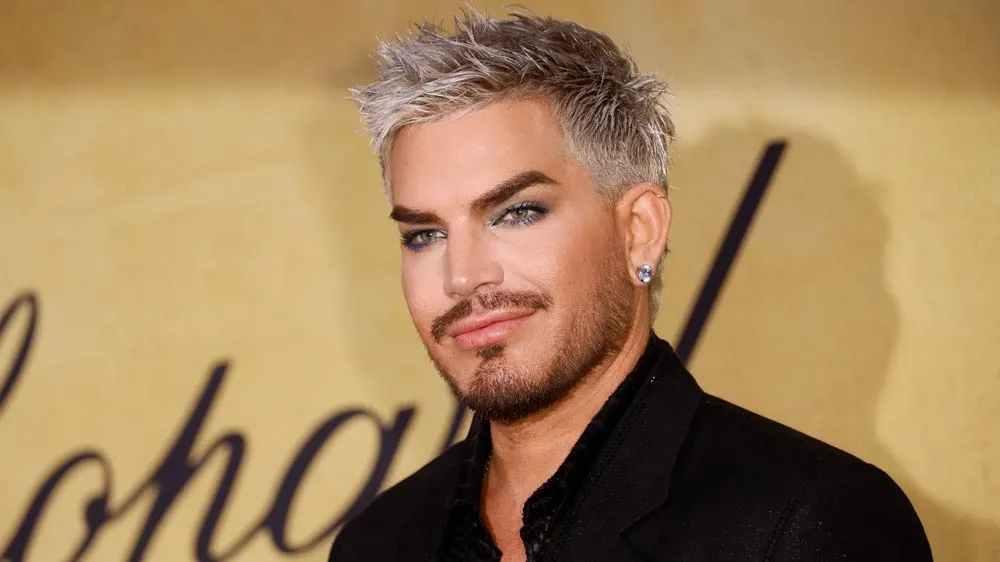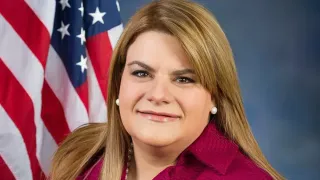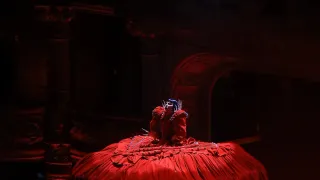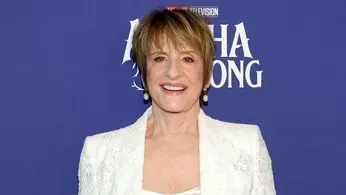
May 27
Why is Queer Icon Patti LuPone Feuding with Audra McDonald?
READ TIME: 7 MIN.
One thing about Patti LuPone – the Broadway superstar is never short on opinions. Or should she called the ex-Broadway superstar because after 30-odd shows, she is stepping back from the grind of eight shows a week.
The three-time Tony winner mentions her retirement in an off-hand comment in the saucy New Yorker profile by Michael Schulman when she tells John Michael King, the showrunner for "And Just Like That," not to forget her name for future projects. "Thank you for including me, honest to God," LuPone said. "And just, you know, think of me. Because I don't want to be onstage anymore. Period."
She was speaking to King after completed a stint on his HBO hit where she plays the Italian mother of the young boyfriend of Carrie's gay pal Anthony (Mario Cantone) in the upcoming season. In addition, she has found a new legion of fans for her ongoing role of a centuries-old witch on the Marvel series "Agatha All Along," and (according to the New Yorker interview) is developing an act with actress, comedian and remarkable vocalist Bridget Everett that's being called "Knockouts." And as evidenced by "A Life in Notes," LuPone last solo show, if any two can knock it out of the park, it is the two of them.
But what's gaining media attention from the lengthy interview is LuPone's comments about Broadway personalities, including director Harold Prince (who staged her breakout hit "Evita"); Kevin Kline, the actor she met in acting class who became her boyfriend for seven years; and the reigning queen of Broadway, Audra McDonald. It turns out they are not friends.
While details are sketchy, she mentions it at the tail end of the interview in the context of her recent feud with an actress from the current hit "Hell's Kitchen." Last fall while appearing in "The Roommate" with Mia Farrow, she shared an adjacent wall with the musical and the sound from the musical was bleeding through the wall into LuPone's dressing room. It was suggested that LuPone reach out to the owner of the theater – the Shubert Organization -- where "Hell's Kitchen" was playing and the problem was fixed; but LuPone found herself castigated in the media by "Hell's Kitchen" Tony-winning actress Kecia Lewis who, the New Yorker reports, posted a video that called LuPone's actions "bullying," "racially microaggressive," and "rooted in privilege," because she had labelled "a Black show loud."
It turns out that McDonald gave the video supportive emojis. Asked about this by the New Yorker, LuPone said: "Exactly," Adding, "And I thought, You should know better. " 'That's typical of Audra. She's not a friend"–hard 'D.' The two singers had some long-ago rift, LuPone said, but she didn't want to elaborate. When I asked what she had thought of McDonald's current production of 'Gypsy,' she stared at me, in silence, for fifteen seconds. Then she turned to the window and sighed, 'What a beautiful day.' "
LuPone had appeared with MacDonald in the Los Angeles Opera production of Kurt Weill/Bertolt Brecht's "The Rise and Fall of the City of Mahagonny" in 2007. Previously they appeared in a concert performance of Stephen Sondheim's "Sweeney Todd" in 2000 with the New York Philharmonic to celebrate his 70th birthday.
They also appeared at Chicago's Ravinia Festival production of Sondheim's "Anyone Can Whistle" in 2008 where LuPone played the show's corrupt mayoress and MacDonald played her rival, an idealistic nurse. In the show, the two sing one of Sondheim's bitchiest duets – "There's Always a Woman." Watch their stand-off in the above video.
Whether the rift between the two occurred during those productions is not known. The New York Post reached out to McDonald for comment, but she had yet to reply as of Tuesday morning.
Whether or not LuPone's dishy comments will have an effect on the voting for the upcoming Tony Awards on June 8 remains to be seen. The balloting is on until June 6. McDonald is out to win her seventh Tony Award – a record – for playing Rose in the current revival of "Gypsy." Her biggest competition is from Nicole Scherzinger in the British revival of "Sunset Blvd." where she plays Norma Desmond. (The official branding of Jamie Lloyd's revival abbreviates the title.)
Of all current actresses, LuPone is a unique position to comment on these big diva roles. She won her second Tony Award in 2008 for the most recent revival of "Gypsy," and was famously fired from the premiere production of "Sunset Boulevard." while it was in London in 1994 – dismissed by Andrew Lloyd Webber, no less, who replaced her with Glenn Close for the Broadway run.
But if she is voting, there is little doubt that LuPone is on Team Nicole. "I thought Nicole was unbelievable. She broke my heart," LuPone told o NY1's Frank DiLella last December, People reported. "She is a force."
LuPone didn't leave "Sunset" without diva dramatics. LuPone wrote in her 2010 memoir, that she was furious when she read the news in Liz Smith's gossip column while backstage in London. "I took batting practice in my dressing room with a floor lamp," LuPone recalled. "I swung at everything in sight – mirrors, wig stands, makeup, wardrobe, furniture, everything. Then I heaved the lamp out the second-floor window."
She sued Webber, winning one million dollars in a settlement, which she used to build a swimming pool at her Connecticut home that she would nickname "The Andrew Lloyd Webber Memorial Pool."
When in April Scherzinger was picked as one of Time Magazine's "The 100 Most Influential People of 2025," LuPone wrote the following: "I didn't know what to expect from Jamie Lloyd's explosive reimagining of Sunset Boulevard. While my experience with the show may not be totally objective, I feel Mr. Lloyd stripped the musical of its bloat, of its too-careful re-creation of the film–and in doing so set a theatrical pace that was exhilarating. Then there was Nicole Scherzinger: courageous, audacious, mesmerizing, elegantly beautiful, and ultimately heartbreaking. Her mad scene alone is worth the price of admission. I left the theater energized. And it's made all the more stunning by watching her transition from a pop singer to a bona fide Broadway star. All audiences want is to be assured the actors onstage are in command. From Nicole's first entrance, I sat back in my seat and happily gave her my complete and undivided attention. I was riveted. Brava, Diva."
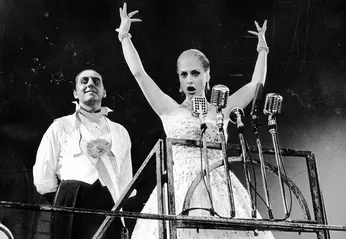
Elsewhere in the New Yorker interview, she derides the late director Harold Prince for the way he treated her during "Evita," which, despite making her a star, was amongst the worst experiences of her life. "I talk to myself a lot," she told the New Yorker. "Why? Don't ask me. But I actually talked about Hal Prince in my head today." The conversation was about how he had tormented her during 'Evita.' 'That stuff doesn't go away. It sits there, going, Why, why, why?'"
She says that Prince wanted her to play Eva Peron as cold and unsmiling. It was, she recalled, a "vitriolic experience." She felt her understudy was gunning for her job and was getting unsolicited advice from cast members as how Elaine Paige had played the role in London. "I said, 'Stop right there. Let me figure it out for myself,'" she recalled. "So I made enemies in rehearsal." This, she believes, forged her reputation as a prima donna. "I had maybe three allies in the company," she said. "It was Beirut from my dressing room to the stage. I had no support. I faced this trial by fire by myself."
LuPone says she lost her sense of humor while appearing in the show and to this day says she never made peace with the pain. "They say it's the way you learn," she said. "But is it necessary? It hurt so much."
What was also painful was her relationship with actor Kevin Kline, whom she met when he joined her as part of the inaugural acting class at Julliard under the direction of noted actor/director John Houseman.
"'I took an instant dislike to him,' LuPone recalls to the New Yorker. 'He looked like Pinocchio to me. He had skinny legs, and he was tall, and I didn't really see the handsomeness.' That changed one day in art-appreciation class, when they sat together in the back and started 'feeling each other up,' LuPone said. Their turbulent on-and-off relationship lasted seven years. 'He was a Lothario,' she recalled. 'It was a painful relationship. I was his girlfriend when he wanted me to be his girlfriend, but, if there was somebody else, he would break up with me and go out with that person. And I, for some reason, stuck it out–until I couldn't stick it out anymore.' Kline remembered the relationship as 'fraught.' 'We fought all the time,' he told me. 'In the company, we were known as the Strindbergs.'"
Also when the subject turned to her huge fandom in the queer community, LuPone says: "People ask, Why am I a gay icon? I go, Don't ask me. Ask them. But I think they see a struggle in me, or how I've overcome a struggle. What else am I going to do?"
